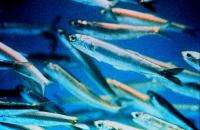July 22, 2011 report
Harvesting of small fish species should be cut: study

(PhysOrg.com) -- New research on the fishing of small fish species near the bottom of their food chains suggests harvesting at levels previously thought to be sustainable could have devastating effects on some marine ecosystems. The researchers strongly suggest harvesting levels should be drastically reduced to protect species further up the food chain that are themselves harvested for human food.
Research scientist Dr Tony Smith of the Commonwealth Scientific and Industrial Research Organization (CSIRO) in Hobart, Tasmania, along with Australian and international colleagues, studied species low on the food chains (known as low trophic level species) such as anchovies, sardines, capelin, mackerel, herring, and krill.
Using computer modelling, the researchers studied the effects of fishing on small fish species in five well-studied ecosystems off the coasts of Australia, southern Africa, California, the North Sea, and Peru. They found that fishing of these species, sometimes even at levels previously thought to be sustainable, can have significant impacts on larger commercially harvested species, on other fish, marine mammals, and seabirds.
Low trophic level species tend to be the most abundant in the food web. They often eat plankton and are preyed on by larger fish, seabirds, and marine mammals such as dolphins and some whales. Harvesting of these small fish species supplies around 30 percent of the global fish catch, and in many developing countries they are a vitally important source of food. Much of the catch is also ground up to produce fish meal for use in fish farms and to provide food for livestock.
The impacts are not the same everywhere. For example, harvesting anchovies off the coast of south east Australia has little impact on the local ecosystem, but harvesting them off the Californian coast has a strong impact. The impacts were found to be greatest when these species form a “high proportion of the biomass in the ecosystem or are highly connected in the food web.”
The paper, published in Science this week, suggests catches should be drastically reduced and no-fishing zones might also be needed. Dr Smith said fisheries could still achieve 80 percent of what has up to now been considered the maximum sustainable yield (MSY) for these species if they halved the harvesting of these fish, and this would significantly reduce the impact on ecosystems and prevent their collapse, as well as helping stocks of larger fish species to recover from a decline caused by over-fishing.
The research is the first comprehensive study of the impacts of catching low trophic species on members higher up the food chains. The findings have implications on securing the human supplies of all fish species for food.
More information: Impacts of Fishing Low–Trophic Level Species on Marine Ecosystems, Science DOI:10.1126/science.1209395 Published Online 21 July 2011
ABSTRACT
Low–trophic level species account for over 30% of global fisheries production and contribute significantly to global food security. Here, we use a range of ecosystem models to explore the effects of fishing low–trophic level species on marine ecosystems, including marine mammals and seabirds, and on other commercially important species. In five well-studied ecosystems, we find that fishing these species at conventional maximum sustainable yield (MSY) levels can have large impacts on other parts of the ecosystem, particularly when they constitute a high proportion of the biomass in the ecosystem or are highly connected in the food web. Halving exploitation rates would result in much lower impacts on marine ecosystems, while still achieving 80% of MSY.
© 2010 PhysOrg.com


















